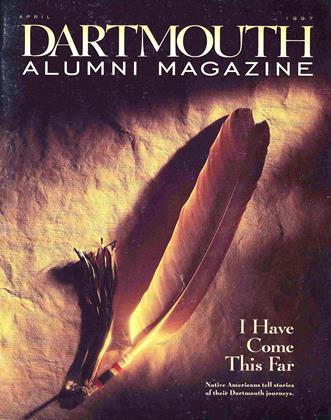Flashes in the River (Willow Creek Press), watercolors by Arthur Shilstone, evocative word pictures by Ed Gray '67, is a gem of a fly-fishing book. The paintings and essays take you through the seasons and across the continent, starting in Dartmouth's own College Grant in the storm-swollen waters of the Dead Diamond River. Many of Gray's essays first appeared in his own magazine, Gray's Sporting Journal, and in Sports Afield, where he has been a contributing editor. (He lives and writes freelance, today, from Lyme, New Hampshire.) His writing on fishing —filled with insights about human nature, perfect touches of metaphor, fresh descriptions —is as welcome in this genre as a warm April day in New Hampshire. The paintings speak for themselves.
Fans have been writing to ballplayers since the days of Abner Doubleday—but none has ever done so like Hollywood songwriter and encyclopedically-gifted Seth Swirsky '82, one youngster whose mother couldn't possibly have ever thrown out his baseball cards. In Baseball Letters: A Fan's Correspondence with his Heroes (Kodansha Internationa]), Swirsky recalls plays and players from as far back as his grandfather's day. He wrote personal notes to nearly 100 "I was there" participants to leam what really happened in some of baseball's most-often recounted incidents, and got back hand-written replies: from the 1932 Cubs' Woody English, on whether the Babe really called that Series shot; from the 1986 Red Sox's Dave Stapleton, on whY that dribbler needn't have gone through the hapless Bill Buckner's legs; from the Tigers' Elden Auker, on what happened to the bench jockey who baited Hank Greenberg with anti-Semitic remarks; and so many more. It is not recommended to any resident of the Field of Dreams to begin turning rhe pages of this book if you have an important engagement within the next two hours.
Martin Anderson '57 has been around the academic track. A Ph.D. from MIT, tenured at Columbia, author of six books, policy adviser to Nixon and Reagan, Anderson now nestles comfortably on the Stanford campus at the Hoover Institution, publishers of this volume, Impostors in the Temple. The book has just been reissued in paperback and with a new prologue. Subtitled/1 Blueprint for Improving HigherEducation in America, the book asserts that our colleges and universities, now big business, are not subject to busmess's usual economic checks and balances. Academe stiil answers only to itself, resulting in a "smug, arrogant, elitist" lack of integrity. As Professor Anderson quotes Dartmouth's Jeff Hart '51, "they are contemptuous of the world outside of the academy, and resentful of its power." Despite such assertions, it is not until the sub-chapter "Corruption," when Anderson ranks liberalism right up there with plagiarism and fraud, do we have too much with which to disagree. He submits ten suggestions for the nation's trustees to mull over; he is convinced thatdespite their general lack of understanding oftheworld thatis nominally their responsibility, they alone can eventually muster the objectivity to throw the impostors out.
 View Full Issue
View Full Issue
More From This Issue
-
 Cover Story
Cover StoryI Have Come This Far
April 1997 By Robert A. Bennett '93 -
 Feature
FeatureNative America at Dartmouth
April 1997 By Karen Endicott -
 Cover Story
Cover StoryWhy Don't You Say Anything?"
April 1997 By Davina Begaye Two Bears '90 -
 Cover Story
Cover StoryMy Grub Box
April 1997 By Vivian Johnson '86 -
 Cover Story
Cover StoryI Dance for Me
April 1997 By Elizabeth Carey '93 -
 Cover Story
Cover StoryWe Are Not Your Indians
April 1997 By Arvo Mikkanen '83
Article
-
 Article
ArticleA Ski Jumper Just After Leaving the Take-ofF at the New Jump
January, 1923 -
 Article
ArticleHonorary Degrees Awarded to Eight
August 1946 -
 Article
ArticleClub Calendar
December 1951 -
 Article
ArticleMasthead
October 1954 -
 Article
ArticleGroup Flights to London Are Open to Alumni
JANUARY 1968 -
 Article
ArticleTHE CLASS OF 1926
November, 1922 By E. GORDON BILL

